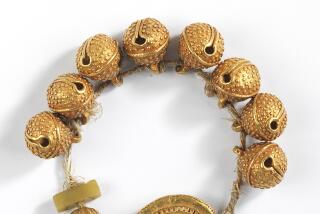Iraq Will Return Loot to Kuwait : Concessions: Baghdad officially renounces its annexation of emirate. The booty includes airliners, gold, priceless art treasures.
- Share via
AMMAN, Jordan — In a flurry of concessions to Kuwait and its allied liberators, Iraq officially renounced its annexation of the war-ravaged emirate on Tuesday and vowed to return hundreds of millions of dollars worth of looted property, including nearly a dozen civilian jetliners, gold taken from a Central Bank vault and scores of priceless museum pieces.
Iraqi Foreign Minister Tarik Aziz announced the measures in a letter to U.N. Secretary General Javier Perez de Cuellar. The action was reported on a Baghdad Radio broadcast and was noted by Iraq’s official news agency late Tuesday.
The concessions by Iraq’s ruling Revolutionary Command Council, Aziz stated, were meant to satisfy last week’s U.N. resolution, demanding that Iraq annul all legislation that made Kuwait its 19th province and declare its intention to pay war reparations to the devastated nation before a formal cease-fire in the Gulf War would take effect.
But Kuwaiti officials at the United Nations on Tuesday indicated that they found the Iraqi moves insufficient, arguing that Iraq’s National Assembly, rather than the Revolutionary Command Council should have rescinded the annexation. The issue, Reuters news agency reported, may come up before the U.N. Security Council.
Iraq’s national treasury is now all but bankrupt after a seven-month international embargo ground the nation’s economy to a halt. Baghdad’s vow to return everything it stole from Kuwait after its Aug. 2 invasion was seen by most analysts as an attempt to fulfill the U.N. demand that Kuwait be reimbursed.
“I have the honor to inform you that the Iraqi government has decided to implement its agreement on the decision of the Security Council,” Aziz declared in the text of letter reported by the Iraqi News Agency in Baghdad.
Aziz also told Perez de Cuellar that the Revolutionary Command Council, chaired by President Saddam Hussein, decided to return “all properties that fell into our hands after Aug. 2.”
Specifically, Aziz mentioned gold, Kuwaiti currency, passenger jets and museum property, all of which eyewitnesses saw Iraqi occupation forces methodically loot from official and private buildings throughout Kuwait city during the six months after Iraq’s brutal invasion.
The property, Aziz said, will be returned in the shortest time possible, and the foreign minister requested Perez de Cuellar to establish formal procedures for delivery.
The gold presumably came from the looting of Kuwait’s Central Bank vault, which Kuwaiti resistance sources had described in detail within days of the Iraqi invasion. Iraqi soldiers had blown the vault with dynamite and loaded several trucks with cash and gold bars, resistance sources said.
The aircraft, mostly Airbus-300 passenger jets belonging to state-owned Kuwait Airways, were spirited away from Kuwait city’s international airport about a month after Iraq conquered the emirate.
The planes had been flown to the new international airport in Iraq’s southern city of Basra, where all were repainted and retooled to look like Iraqi Airways passenger jets. Because of the widespread unrest in Basra, the jets’ status was unclear Tuesday.
Aziz’s reference to museum property clearly meant hundreds of priceless items that the Iraqis removed from Kuwait’s national museum, an act that outraged the international art world.
What remained unclear, even after Aziz’s pledge on Tuesday, was the fate of tens of thousands of other items systematically looted from Kuwaiti government ministries, from private corporations and from thousands of civilian households during the occupation.
In interviews with a Times reporter during the occupation, businessmen and foreigners fleeing Kuwait city gave graphic descriptions of looting so methodical and directed from such high levels of the Iraqi government hierarchy that one called it “official requisition.”
Witnesses described how Iraqi leaders sent ministers to Kuwait, where they directed the looting from suites at the Hilton Hotel. Among those leaders was Saddam Hussein’s son, Uday, whom Iraqi opposition leaders assert was killed in the continuing unrest in nearby Basra.
Entire ministry buildings were stripped of computers, fax and photocopy machines, typewriters, desks, couches, chairs and, in the words of one eyewitness, “everything that could be moved.”
Other witnesses spoke of items that could not be moved so easily. Traffic lights, huge power generators, street lamps and even telephone poles were mentioned among the goods that Iraqi soldiers were seen loading into convoys of trucks that then drove north toward Iraq.
Foreigners in Kuwait city’s hospitals described in detail how Iraqi soldiers and civilians stripped Kuwait’s better-equipped medical centers of sophisticated X-ray, CAT scan and other diagnostic machinery. One described how Iraqi officials raided the cancer ward of one hospital, taking special food and jellies, later used in a dessert served at a party in honor of Iraq’s health minister.
Thousands of luxury cars also were stolen or stripped bare, not only by Iraqi soldiers and civilians but by their non-Kuwaiti supporters living in city.
It remained equally unclear whether goods looted from the homes of hundreds of thousands of expatriate workers who fled Kuwait, among them Westerners who became official hostages of Iraqi for several months, would be returned.
One Indian fleeing the city last fall, for example, showed a promissory note for $9 million signed by an Iraqi officer covering a vast array of equipment, food and other goods seized by the occupation army--an amount, he conceded at the time, that he never expected to collect.
More to Read
Sign up for Essential California
The most important California stories and recommendations in your inbox every morning.
You may occasionally receive promotional content from the Los Angeles Times.













